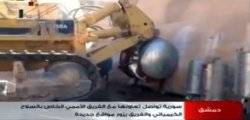Ships waiting to remove Syria's chemical weapons have returned to port in Cyprus because the country has missed a December 31 deadline.
Syria was supposed to have removed part of its chemical weapons arsenal for destruction on Tuesday, but Wael Nader Al Halqi, Syria's prime minister, said security concerns and bureaucracy had caused delays in transporting the weapons to the Syrian port of Latakia.
International inspectors insisted the overall mission was still on track, as Scandinavian ships continued training exercises off Cyprus in preparation for transporting the toxic cargo.
The delay came as the Syrian Observatory for Human Rights said more than 130,000 people had been killed since the conflict began in March 2011, with the overwhelming majority caused by conventional arms.
The prospects for a peace conference slated for next month appeared to dim further, with Syrian media reporting the delivery of invitations to the meeting had been delayed.
Syria had been due to turn over some of the deadliest chemicals in its arsenal to ships by the end of the year, for delivery to a US boat which is to destroy them at sea.
However, Norwegian and Danish vessels that had been waiting off the Syrian coast returned to port in Cyprus late Monday as it became clear the mission would not go ahead as scheduled.
Lars Hovtun, a spokesman for the Norwegian ship HNoMS Helge Ingstad, gave no new date for the mission to escort the dangerous cargo out of Syria.
"We are still on high alert to go into Syria," he said.
"We still don't know exactly when the orders will come."
However, the Organization for the Prohibition of Chemical Weapons (OPCW) spokesman Christian Chartier said the overall plan to rid Syria of its chemical arsenal was on track.
"An enormous amount of work has been accomplished in three months," Chartier told AFP news agency.
"Syria's chemical arsenal has been completely neutralized, the chemical agents and chemical products are under international control, have been sealed... The effective dismantling of the production and filling plants is on course.
"Their capacity to produce and use chemical weapons has been reduced to zero."
Chartier said the operation was still on track to meet a deadline to rid Syria of its chemical arsenal by mid-2014.
Nevertheless, the head of the disarmament mission, Sigrid Kaag, called on all parties including Damascus to "intensify efforts" to destroy Syria's chemical arsenal within the timetable.
Kaag told AFP the delay was the result of various obstacles and underlined the complexity of dismantling a chemical weapons programme in an active war zone.
PHOTO CAPTION
An image grab taken from Syrian television on October 19, 2013 shows a mechanical digger destroying chemical weapons at an undisclosed location in Syria.
Aljazeera


 Home
Home Discover Islam
Discover Islam Quran Recitations
Quran Recitations Lectures
Lectures
 Fatwa
Fatwa Articles
Articles Fiqh
Fiqh E-Books
E-Books Boys & Girls
Boys & Girls  Ramadan
Ramadan Fatwa Audios
Fatwa Audios Month of Mercy
Month of Mercy Women
Women Eed Al- Fitr
Eed Al- Fitr Food Recipes
Food Recipes Videos
Videos

 Prayer Times
Prayer Times












